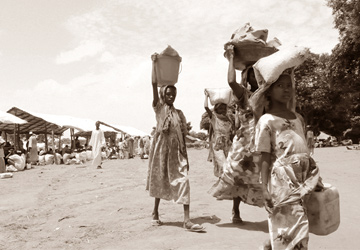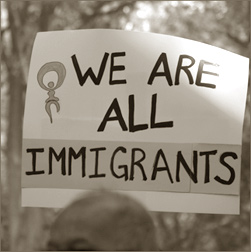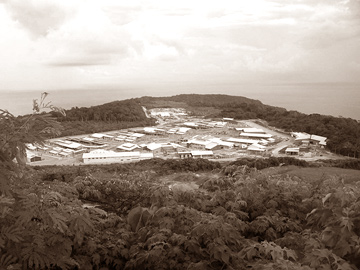|
International Migrants Day on December 18:
Migrants make the world a better place
by Pramod DE SILVA
On December 4, 2000, the United Nations General Assembly, taking into
account the large and increasing number of migrants in the world,
proclaimed December 18 as International Migrants Day. A decade earlier,
in 1990, the Assembly had adopted the International Convention on the
Protection of the Rights of All Migrant Workers and Members of Their
Families. According to the International Organisation for Migration
(IOM), there are 214 million migrants around the world.
 UN Member States, inter-governmental and non-governmental
organisations observe the International Migrants Day through the
dissemination of information on the human rights and fundamental
freedoms of migrants, and through the sharing of experiences and the
design of actions to ensure their protection. UN Member States, inter-governmental and non-governmental
organisations observe the International Migrants Day through the
dissemination of information on the human rights and fundamental
freedoms of migrants, and through the sharing of experiences and the
design of actions to ensure their protection.
Migration is one of the defining issues of the 21st century. It is
now an essential, inevitable and potentially beneficial component of the
economic and social life of every country and region.
“The question is no longer whether to have migration, but rather how
to manage migration effectively so as to enhance its positive and reduce
its negative impacts. Well-informed choices by migrants, governments,
home and host communities, civil society, and the private sector can
help realise the positive potential of migration in social, economic and
political terms,” says the UN.
The Migrants Day is relevant to Sri Lanka in the context of the
country’s large migrant population of nearly 1.5 million. Most of them
are in the Middle East, but more migrants are heading to ‘new’ countries
such as Korea, Italy and Singapore. Women dominate the migrant
population, but more jobs are being made available for males. At least
another million Sri Lankans have left our shores to reside permanently
in other countries, including the US, UK, Australia, New Zealand, Canada
and Italy. This includes both economic or political asylum seekers and
professionals who had gone through the proper immigration procedures of
the respective countries.
Migration for employment is important to Third World countries
because expatriates’ remittances sustain their economies. Migrants’
remittances are among the top three foreign exchange earners for Sri
Lanka. This also helps to raise living standards of rural families, most
of which have at least one member working abroad.
Migration for employment has its fair share of problems. Those who go
to various countries primarily through illegal channels have no recourse
to help in case of trouble with their employers. Social problems have
arisen in many households as mothers have left for employment abroad.
There are many instances when fathers have squandered the monies sent to
Sri Lanka, through alcohol or drug abuse and other nefarious activities.
Illegal migrants
 Another major problem is illegal migration either for employment or
for permanent residency. Unfortunately, Sri Lanka has gained notoriety
as a source of illegal migrants, with ships illegally carrying its
nationals being intercepted regularly in international waters. Nearly
all of them are economic immigrants. Such ships were recently
intercepted off Canada and Indonesia, the gateway to Australia. Another major problem is illegal migration either for employment or
for permanent residency. Unfortunately, Sri Lanka has gained notoriety
as a source of illegal migrants, with ships illegally carrying its
nationals being intercepted regularly in international waters. Nearly
all of them are economic immigrants. Such ships were recently
intercepted off Canada and Indonesia, the gateway to Australia.
This is a process where people from poor countries try to migrate to
the rich countries of the West in search of elusive riches. A whole
‘industry’ has grown around this dream.
In its most basic form, this industry is called human smuggling or
trafficking. There are traffickers who demand thousands of dollars per
person for a risky ocean voyage to the West or Australia/New Zealand.
Once on those shores, the illegal immigrants are left to their own
devices - and fate. The traffickers who organise these trips make
enormous profits and sometimes disappear with those funds to unknown
destinations so that they cannot be tracked by law enforcement agencies.
There are several factors that propel individuals in developing
countries to undertake these risky sea voyages where hundreds are
crammed into a rickety vessel with little or no margin for safety and
hygiene. One factor is a perceived, often not real, sense of insecurity
in their native countries.
Another reason could be the lack of employment opportunities. Some
are just driven by a desire to ‘make it big’ in the West. Most of them
never realise that the thousands of dollars they had paid to the
trafficker could well have been used for a profitable venture in their
native country.
Unfortunately, this message is not properly driven home among the
youth, many of whom aspire to earn more in a foreign land. The
authorities and the media have a major role to play in convincing the
people about the inherent dangers of illegal immigration. The IOM
frequently conducts awareness programs on this issue in collaboration
with the authorities, which the media must highlight.
Employment opportunities
One problem that causes legal and illegal migration seems to be the
lack of employment opportunities in the country for certain segments.
Sri Lanka does have one of the lowest unemployment rates in the region,
but it is important that more employment opportunities are created
within the country.
It would be beneficial if more opportunities can be created for
unskilled persons, to train them in various vocations for employment in
Sri Lanka itself. There is a clear mismatch between the education system
and the needs of the job market.
Take any Sunday newspaper and one can find hundreds of vacancies in
every sector - but the sad truth is that there are only a few takers for
most of these jobs. If our education system can be structured in such a
way that these needs can be addressed, a lot of youth would prefer to
stay here and engage in such vocations.
 |
|
Boat people - a
frequent sight |
Another approach is the creation of more legal employment
opportunities outside the country, especially for the skilled. More
avenues must be opened for legal migration, be it for employment or
permanent settlement. The authorities are looking at a range of other
countries and signing agreements with some of them for employment.
Italy, one of the prime targets of illegal immigrants, is one of those
countries. The creation of legal employment opportunities in such
countries is a welcome move.
There should be a dialogue between the developing and developed
worlds over the issue of immigration. Europe used to be known as
Fortress Europe. This is largely driven by internal politics and a
phobia for migrants among the indigenous populations, but such a policy
is counter-productive in the long run. After all, immigrants make a huge
contribution to the socio-economic landscapes of their host countries.
These countries must re-examine their border control and immigration
policies in view of current developments. Australia, Canada and New
Zealand already have legal immigration programs mainly targeted at
skilled personnel in the developing world. The US has the unique
Diversity Visa Lottery, which grants Green Card status to around 55,000
persons from a select list of countries every year. European countries
should closely look at these models and explore the possibility of
formulating similar programs, which will help block or reduce attempts
at illegal entry. Even those countries with legal immigration policies
and programs could possibly vary their parameters to afford more people
an opportunity to enter and live in their countries legally.
Climate change
There is one other somewhat unlikely factor that could cause
mass-scale migration: climate change.
Climate change stands to drive as many as one billion people from
their homes over the next four decades, the IOM said in a study
published last week.
 |
|
An offshore detention
centre for illegal immigrants |
The IOM report, launched on the second day of international climate
talks in Copenhagen, estimated 20 million people were made homeless last
year by the sudden onset of environmental disasters that are set to
amplify as global warming increases. Perhaps the best example is
Maldives, which is looking for alternative lands in other countries for
its population.
The IOM cited a wide range of projections for numbers of people
likely to be displaced. “Estimates have suggested that between 25
million to one billion people could be displaced by climate change over
the next 40 years,” the report said.
The number of natural disasters has more than doubled in the past 20
years, and the IOM said desertification, water pollution and other
strains would make even more of the planet uninhabitable as greenhouse
gases keep building up.
It also identified “future hotspots” where large numbers of people
are expected to flee as a result of environmental and climate pressures.
These include Afghanistan, Bangladesh, most of Central America, and
parts of West Africa and Southeast Asia. Conflicts also drive millions
of people away from their homelands, not to mention those displaced in
their own countries.
Judging by all these aspects, migration is a complex issue. It is a
worldwide phenomenon and a never-ending process. Migrants have the
potential to make their home countries prosper thanks to their
remittances and they also make a valuable contribution to the economies
of the host nations. They also increase the cultural and linguistic
diversity of their host countries.
But ways and means must be found to encourage legal migration because
illegal migration results in a myriad of problems for all concerned.
That will take some effort but it is the correct approach to a complex
issue. |

